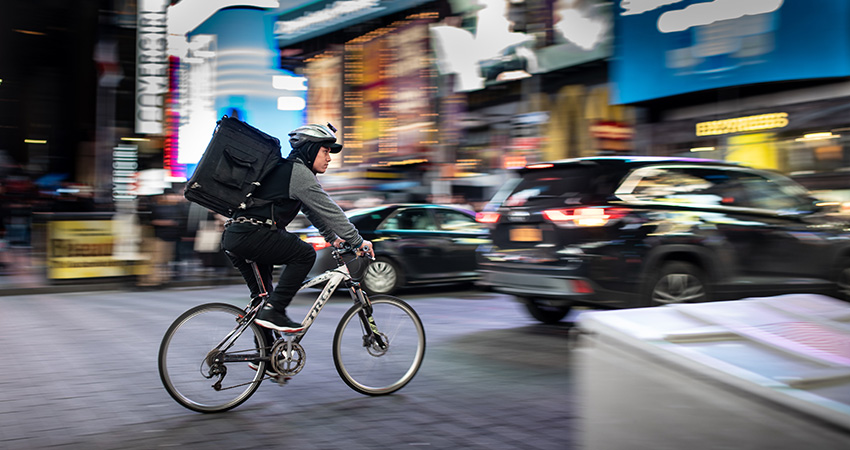Credit: Brett Jordan on Unsplash
Before the pandemic, it was projected that the growth of ecommerce would lead to a significant increase in delivery related carbon emission. However, the past year’s drastic reliance on ecommerce accelerated trucking’s carbon footprint, including the increase in last mile deliveries, heightening concerns over the increasingly negative impact on the environment.
Road freight’s contribution to Co2 emissions is expected to grow 56% by 2050, according to a report in Visual Capitalist. When looking at the entire supply chain, retail surpasses the oil and gas industry as well as the automotive industry in terms of carbon emission output. In fact, it is responsible for over 50% of industrial carbon emissions.
The topic of sustainability is unavoidable, with 67% of consumers identifying as environmentally aware, according to a study by Boston Retail Group and Trivium Packaging. Consumers are not only holding organizations responsible for their environmental impact; they are even willing to pay for sustainability themselves. 57% of consumers are willing to change their habits to reduce negative environmental impact, according to an IBM study, and 37% are willing to pay a 5% premium for a more sustainable product, according to a report from Toluna.
As a result of this increasing public and stakeholder focus on the environment, sustainability is top of mind for retailers. From a broader perspective, by 2030, Gartner projects 60% of companies will include sustainability in their top three priorities, and many high-profile companies already have initiatives in place to support greener futures.
There is a real urgency for retailers to address the sustainability factor in ecommerce head on. With today’s wave of socially conscious consumers, incorporating sustainable practices across the supply chain is the next big challenge and is imperative for retailers to prioritize, especially those focused on long-term growth.
This is easier said than done, but what can retailers realistically do to address and win against these challenges?
The Net-Zero Pledge and Internal Carbon Pricing
One of the interesting initiatives retailers may want to explore is committing to net-zero pledges. The Intergovernmental Panel on Climate Change (IPCC) defines net-zero emissions as the “equal balancing of anthropogenic greenhouse emissions with anthropogenic greenhouse gas removals over a specific period.” These pledges often include a tangible plan to reduce carbon footprint, KPIs to track carbon emission, and reporting processes.
Since December 2019, the number of net-zero pledges have increased 3.2x, according to a Yale study, with 26 of U.S. S&P 500 companies implementing a net-zero goal. It is imperative that retailers consider this initiative in their larger business plans not only to meet expectations from the public domain but also to remain competitive in the market.
In addition to net-zero pledges, many companies utilize internal carbon charges. According to McKinsey, “Some companies are setting an internal charge on the amount of carbon dioxide emitted from assets and investment projects so they can see how, where, and when their emissions could affect their profit-and-loss (P&L) statements and investment choices.” An additional McKinsey study found that in 2021, 21% of companies have implemented internal carbon pricing, and this is expected to rise to 45% by 2023. The act of putting an internal price tag on any carbon produced is growing and will ensure companies make more sustainably sound decisions.
While many organizations may initially shy away from the sustainability discussion due to a perceived high price-tag, fortunately, there are a variety of ways retailers can implement sustainable methods in the last mile, affordably. Through new considerations in transportation, new technologies and more, retailers will be able to better mitigate harmful environmental effects in the last mile, without major expense.
Tackling Sustainability, Affordably
Many times, longer routes can be associated with more fuel and mileage, leading to a more negative impact on the environment with more emissions. Route optimization software enables increased sustainability by automatically planning the sequence of stops with greater drop density to create the most environmentally conscious routes. This results in less mileage consumed – with drivers reaching more stops per run and covering fewer miles – ultimately lowering the emission of greenhouse gasses.
Additionally, the availability of zero-emission forms of transportation continues to grow rapidly with delivery bots, drones and autonomous electric cars becoming more widely utilized. However, old-school methods of zero-emission transportation work just as well in metropolitan areas, with deliveries on foot, by bike or by public transportation becoming the norm. Retailers that find alternative, more energy efficient modes of transportation for fulfilling ecommerce orders will be in a better position in terms of contributions to a greener supply chain.
Finally, creating a more efficient delivery process is another key method to reduce greenhouse gas emissions in the last mile. For companies that manage on-demand deliveries, automated order batching tools and delivery orchestration can group multiple orders going to the same area, regardless of when they were ordered. This prevents drivers from delivering twice to the same area around the same time, cutting emissions and saving retailers time, money and resources.
It is clear that given today’s consumers expectations for immediate and simple deliveries, organizations with online operations must reevaluate their logistical operations before overworking employees and disappointing valuable customers. Creating an entirely sustainable last-mile delivery process doesn’t have to be painful — it just requires good strategy and serious consideration of all the elements that contribute to a greener operational environment.
Guy Bloch is the CEO of Bringg

